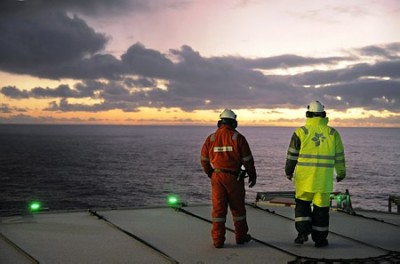As the oil and gas industry eyes new resources in Norway’s offshore Arctic, and celebrated another new discovery in the North Sea this week, comes word that a majority of Norwegians remain skeptical towards more oil and gas exploration and extraction. A recent survey shows that 62 percent want the government to slow down the pace of drilling, and let Norway’s oil resources lie where they are for now.

The survey, conduced by research firm Ipsos MMI for the state environmental ministry (Miljøverndepartementet), showed that only two of 10 Norwegians strongly agree that offshore oil should be extracted as quickly as possible to realize its value. Newspaper Dagsavisen reported that the survey also revealed that only 32 percent of those questioned think oil companies must be allowed to drill along the entire coast, and agree that it’s most important to gain access to oil reserves and secure jobs in the oil and gas sector.
Fully 58 percent of Norwegians questioned agreed that all oil operations must be limited to the areas where there already is activity today.
The numbers are good news for the environmental organizations that have been working for years to put limits on Norway’s offshore oil and gas operations, and bad news for Oil Minister Ole Borten Moe of the Center Party, which is keen on economic development in Norway’s outlying areas. The survey was released just as Moe was hosting representatives from some of the world’s largest oil companies last week, including the US Secretary of the Interior Ken Salazar and Canada’s minister in charge of Arctic issues, John Duncan.
Moe, who’s been bullish on opening up Norwegian territory in the Barents and Norwegian seas for oil and gas exploration, was also in the midst of releasing new blocks for exploration. Of the 86 new blocks, which can clear the way for new extraction permission by next summer, 72 are located in the Barents Sea and 14 in the Norwegian Sea.
“We’re seeing record high interest in the Barents Sea,” Moe said, referring to the Barents as a “sea of opportunities.” Moe said the area has produced “very encouraging exploration results, and I’m now giving the industry access to new areas tied to these discoveries.”
‘King Lear’ climax
Meanwhile, Norwegian oil company Statoil was preparing to release its announcement this week that it had struck new sources of oil and gas in a mature area of the North Sea around the Ekofisk field. The new so-called “King Lear” discovery can hold as many as 200 million barrels of oil equivalents, according to Statoil’s exploration director Gro Gunleiksrud, and Statoil thinks the North Sea can still yield even more new sources.
“That’s exactly what’s so exciting here,” Gunleiksrud told newspaper Dagens Næringsliv (DN). “After 40 years with activity in the North Sea, the area is still delivering. There are more possibilities here, something we hope to keep revealing.” Stock in Statoil, which controls 77.8 percent of the King Lear field along with partner Total E&P Norge, jumped on the news of the field’s gas and condensate prospects, to its highest level since mid-May.
Discoveries in such already-active offshore areas are likely more acceptable to the majority of Norwegians, given the survey results, and industry experts have acknowledged that they can’t write off the North Sea and look only to untapped Arctic areas. Lars Haltbrekken of Norway’s chapter of Friends of the Earth (Naturvernforbundet) warned, however, that Moe and other government officials must not ignore the public concerns about oil and gas exploration revealed in the survey.
‘Collision course’
“These numbers show that the oil minister is on a collision course with with public opinion,” Haltbrekken told Dagsavisen. “Fishing and environmental interests are also on the line. There doesn’t seem to be any limit on where the oil minister is wiling to allow oil operations.”
Caught in the middle is Moe’s government colleague, Bård Vegar Solhjell, new minister for the environment from the Socialist Left party (SV). He told Dagsavisen that the survey “shows that many in Norway have a conscious and cautious attitude” towards exploration. The government coalition, he noted, has agreed on the current tempo of exploration and production approvals, fully realizing that the world needs energy and that Norway’s resources and management of them are the key to the country’s strong economy.
“But I think it’s necessary to discuss the tempo in the run-up to the next national elections,” Solhjell said. “Both because of climate concerns and the enormous growth we’re seeing in the oil industry compared to other industries.”
Views and News from Norway/Nina Berglund
Please support our news service. Readers in Norway can use our donor account. Our international readers can click on our “Donate” button:

